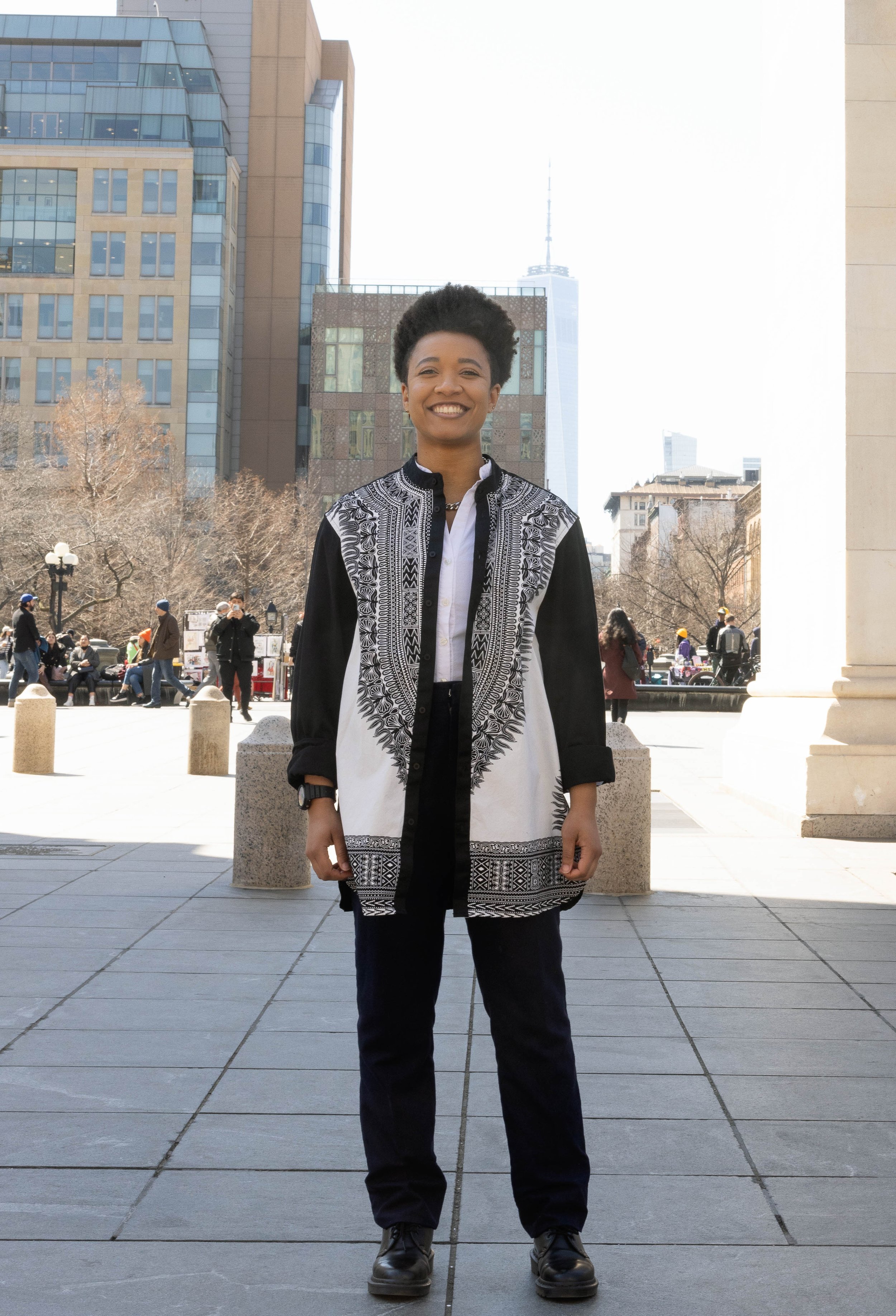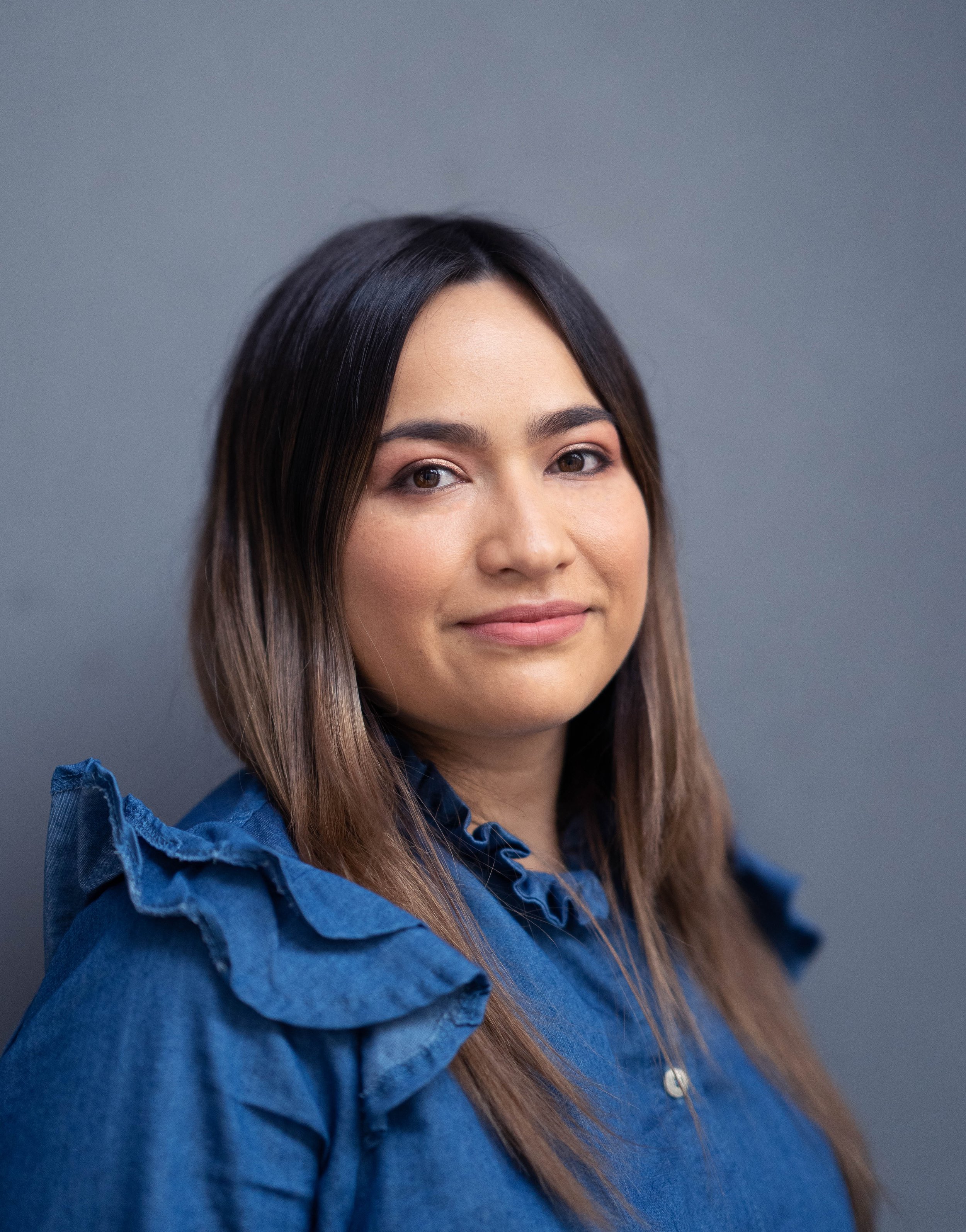2022-2023 Student Awards and Aronson Fellowships Updates
Blog Post by Tian-Tian He
In the fall of 2022, the Tishman Center’s Student Awards and Aronson Fellowship granted funds to eleven students to support their research or design work centering environmental justice; you can read about their project proposals in this blog post. We are excited to highlight the progress of some of our awardees here!
Student Awardees
Carlos José Celis Ortega, Public and Urban Policy, PhD
Carlos José Celis Ortega’s photography project, Bogotá’s Street Nature, aims to blur the frontier of nature and culture through photographs that illustrate the profound relationship between these two concepts. On the one hand, these pictures are a critical portrayal of anthropocentrism. On the other hand, they also evoke a comprehensive view of nature and humanity as parts of one system.
Tian-Tian He, International Affairs, MA
Posting flyers to recruit participants at Chatham Square Library!
Tian-Tian He is working with collaborators Nia Starr (master’s student at the Pratt Institute) and Alicia Leong (medical student at the Icahn School of Medicine) to create the Chinatown Community Climate Report (CCCR), a survey of Manhattan Chinatown residents exploring how climate change affects their lives through paid interviews. It aims to provide a space for Chinatown residents to talk about climate change and bring to light the most significant environmental problems they face, what kinds of support they might benefit from, and ways they participate or are prevented from participating in climate activism.
So far, they have collected seven English-language interviews and have several Mandarin interviews in the works, recruiting from a Traditional Chinese Watercolor class at Chatham Square Library in Chinatown. Some common issues that have emerged so far include urban heat, lack of green space, litter, air quality, the impact of natural disasters on the neighborhood, the tension between daily survival vs. putting energy towards environmentalism, and everyday methods of adapting to climate change.
Barbara (Basia) Nikonorow, Environmental Policy and Sustainability Management, MS
17 Trees, To Be Precise is a children’s book (for ages 3-7 years) about the value of civic engagement and trees. It offers a starting point to talk with kids about community involvement and how anybody can be a spark in their neighborhood. It is illustrated by NYC-based artist Juliette Borda and written by Barbara Nikonorow. The book is inspired by actual events that took place on a small, plain street in Hamilton Heights.
Funded in part by the Tishman Center’s Student Award, 17 Trees, To Be Precise has been translated to Spanish, printed, and is now available for sale! More updates can be found on the 17treestobeprecise Instagram page.
Enrique Valencia, International Affairs, MS
Enrique Valencia and Ansha Zaman’s research project, Supporting Community Capacity Building for Environmental Justice in US EPA Brownfields Redevelopments, seeks to answer the question: What constitutes adequate technical assistance for “Environmental Justice (EJ) communities” participating in the U.S. Environmental Protection Agency’s Brownfields Program (BP)? This research is significant firstly because it critically examines what it means for the BP to be reframed and expanded as an EJ program through Justice40. Secondly, it aims to shed light on how the EJ movement interprets adequate technical assistance for EJ communities, which is presently undertheorized in the academic literature. Drawing from a capabilities and recognition approach, we create a framework for evaluating the BP’s technical assistance components. The methodology for this research includes a public document review, interviews with EJ activists who have first-hand experience participating in BP site redevelopments, and thematic analysis.
So far, Enrique and Ansha have developed a manuscript and presented it at the American Association of Geographers Annual Meeting on May 24, 2023. Next, they plan to incorporate community-informed recommendations, as well as publish a report for a general audience and a journal article.
Other Student Awardees include:
Sofia Krasnaya (Public and Urban Policy, PhD), whose project “THE TURQUOISE CITY” is a space-making program for open public spaces in post-industrial waterscapes based on nature-based solutions;
Zainab Koli (Environmental Policy and Sustainability Management, MS) is collaborating with residents of the village of Kosadi in Gujarat, India, in developing a sustainable waste management system for the town;
Laura Poliné (Environmental Policy and Sustainability Management, MS) visited the Dominican Republic to study Taino survival through Dominican food culture;
Monise Valente da Silva (Public and Urban Policy, PhD), whose dissertation “Faith in the Fight and a Foot on the Ground” investigates the emancipatory potential of land and occupation practices designed and implemented by social movements fighting for housing rights in Brazil;
When I first applied to the Aronson Fellowship, I outlined in my application that “my work relates to the Tishman Center’s vision of being a ‘collaborative resource center and convenor...that supports and advances bold...[social justice] action’ via my 8 years of community engagement and co-design of holistic platforms and projects which promote long-term sustainable educational and cultural growth”. Months later, I believe that still holds true after holding:
An extremely successful Earth Month Convergence co-organized by 6 youth environmental justice organizers that gathered 150 NYCers to learn from 27 beautiful Praxis-educators across 16 events;
Helped the founder of Camp Migizi, Taysha Martineau, get $10k more than asking for a total of 50k of funding for Migizi’s transition into a Cultural Center, as well as work with the other co-writer of the Migizi grant to establish their own collective gathering organizers from Migizi together to acquire, steward, and teach back on the land.
An esteemed guest speaker in the Master of Architecture School of Constructed Environments’ Design Studio 4 Class emphasizing the need for creative, community-oriented and -driven design projects that center environmental well-being;
An informal educator that had the honor of experiencing educational reflexivity for 6 weeks as 28 Walton Campus high school freshmen and sophomores, 2 CUNY freshmen, and myself came together to learn about environmental justice practice and work on 3 campaigns aimed at taking back student power and voice in the school for the purposes of sustainability and school-wide greening;
One of the youngest presenters at the Society for the Study of Social Problems (SSSP) 2023 Annual Meeting (my first academic conference!!) recapping my findings to-date stemming from the aforementioned accomplishments.
I believe that the long-term sustainable educational growth stemming from the stability provided by the Aronson Fellowship fund, has allowed me to further accomplishments 1-4 above in the form of:
Preparing for the launch of Start:Empowerment’s new Curriculum Suite, a digital library for our curriculum both for sale in tiers and for free, in addition to a hub for cooperative creation with Praxis-Educators we’ve built relationships with in the Global South to Abya Yala to continue cultivating systems for the collective sustenance and even ownership of curriculum with this growing population of long-term contributors at the periphery of the imperial core, our current students, and ourselves at Start:Empowerment.
Igniting 5 youth who will act as campus organizers for each of the 5 schools on the Walton Campus furthering their critical campaign work and will serve as case studies for the empowerment variable that Hungerford and Volk outlined in their 1990 “Changing Learner Behavior through Environmental Education” research. This approach upends the idea that increased knowledge leads to awareness which leads to action. Rather, it states that an emotional response to the environment, a knowledge of ecological issues and personal investment lay the groundwork for a concerned citizen. Said citizens are ignited through empowerment, aka via having access to the skills, tools, and resources to intentionally apply their knowledge (even on the smallest of scales) (Hungerford and Volk 260).
Furthering the work of 2 collectives, Sustainable Spaces Collective and Ties to La Tierra, through ongoing mentorship and collaboration. Their work aims to build infrastructure within their respective fields to support mass direct action and anti-capitalist and decolonial ways of living.
Cannabiz Legacy is an incubator program designed to empower entrepreneurs from communities disproportionately impacted by the war on drugs to launch a legal business in the cannabis industry. The program offers mentorship, coaching, business support, training, network, and sales assessment to help legacy operators (formerly incarcerated individuals for cannabis possession charges) build a successful and sustainable business. The program stands out from other incubators by reinforcing entrepreneurs' mental health and creating a safe space with a community of like-minded people. It also integrates design thinking, agile methodologies, and coaching among traditional business training.
The project involved a partnership with Cannabronx and other organizations from the Bronx in developing innovative solutions to promote social equity and inclusion through cannabis legalization. Along with the participation of communities and thought leaders in the industry, the project inspired a contribution from the Open Society Foundations to generate an exchange with a delegation from Colombia, Brazil and Mexico. In August 2023, representatives from the Ministry of Justice, the Ministry of Agriculture, The Supreme Court and 3 NGOs had conversations with stakeholders related to the project to learn about the social equity program rollout in New York. They visited farms, two licensed dispensaries and talked with advocates in different organizations working around reparations for communities affected by the war on drugs.
This exchange and the program proposal were the basis for an article in Colombia's most prominent independent news portal, La Silla Vacia.











